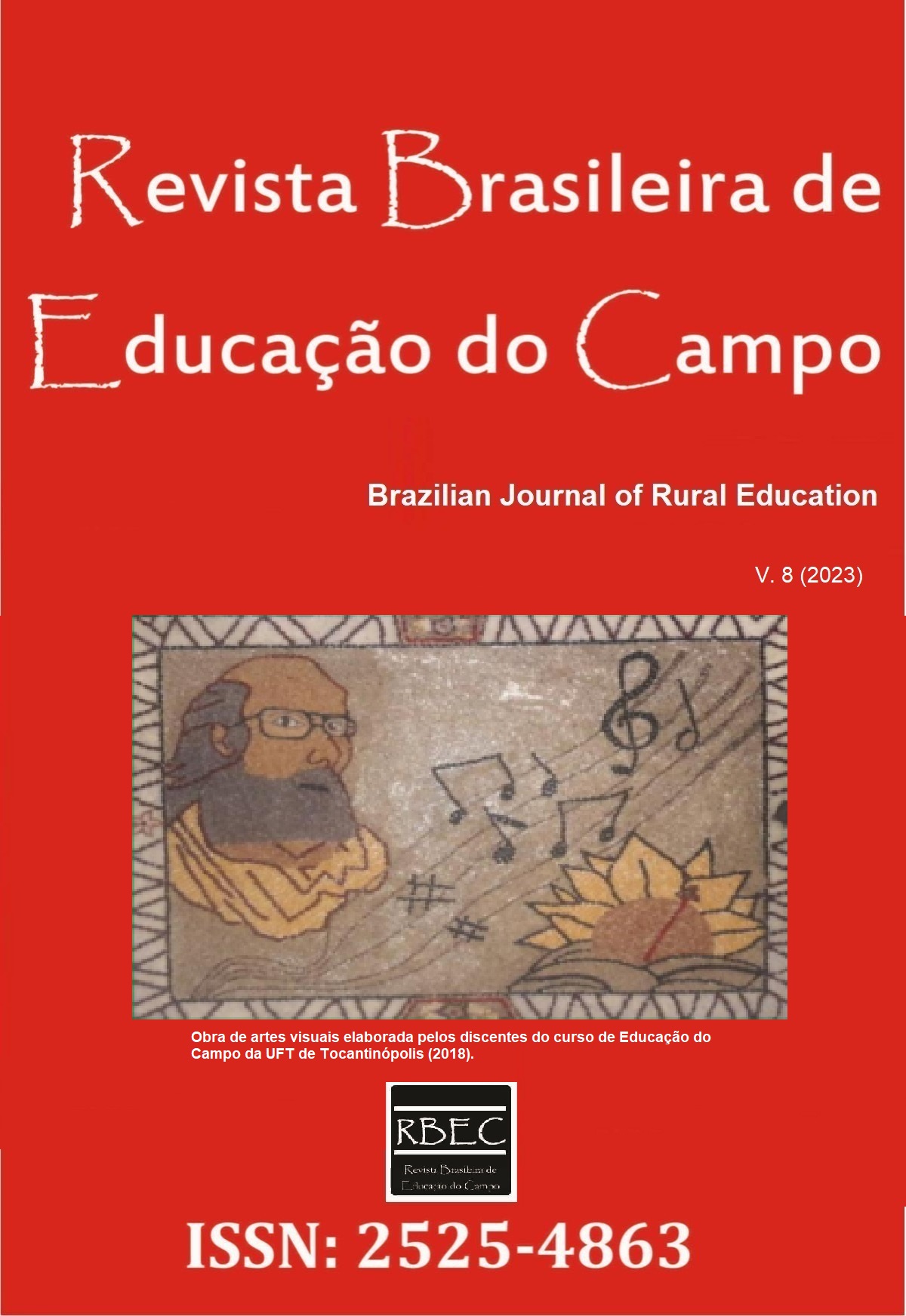Arpillerando with high school youth from a rural school - collective embroidery of the struggle for land
DOI:
https://doi.org/10.20873/uft.rbec.e14974Abstract
ABSTRACT. This article is the synthesis of the research, presented in 2022 at the Postgraduate Program in Education - Professional Masters, at the State University of Rio Grande do Sul. The research sought to understand the story of four young people in the struggle for land. The production of data used the sewing of arpillleras, students of the Josué de Castro Institute of Education, located in Viamão, Rio Grande do Sul. The embroideries were named: Occupy, Resist, Produce and Conquer. The analyzes were motivated by legal documents and theorists such as: Frantz Fanon, Milton Santos, Paulo Freire, among others. The study showed that: a) students do not give up their own pedagogy, they update the demands for the guarantee of human rights to contemporary subjects in the field; b) young people produce knowledge based on their concrete realities; c) individual memories of struggles cannot be understood apart from Social Memories; d) Rural Education is the ballast for the concreteness of the settlement, and the encampment is the place where the seed of the school is planted; e) the production of arpilleras as a tool for analysis has been transformed into powerful records of stories, revealing the transforming power of Art-Education in the liberating perspective.
Downloads
Literaturhinweise
Alves, M. S., & Trocate, C. (2020). Análise de conjuntura política, econômica e social da mineração no Brasil e os enfrentamentos necessários. In Alves, M. S., & et al. (Orgs.). Mineração: realidades e resistências (pp. 20 – 40) São Paulo: Editora Expressão Popular.
Bacic, R. (2011). Catálogo da exposição “Arpilleras da resistência política chilena - de la resistência política chilena”. São Paulo: Pinacoteca do Estado.
Barbosa, A. M. (1998). Tópicos utópicos. Belo Horizonte: C/Arte.
Base Nacional Comum Curricular – educação é a base. (2017). Recuperado de: http://basenacionalcomum.mec.gov.br/abase
Caldart, R. S. (2004). Pedagogia do Movimento Sem Terra. 3. ed. São Paulo: Expressão Popular.
Censo Escolar 2020. (2020). Instituto Nacional de Estudos e Pesquisas Educacionais Anísio Teixeira – INEP. Recuperado de: https://www.gov.br/inep/pt-br/areas-de-atuacao/pesquisas-estatisticas-e-indicadores/censo-escolar/resultados
Decreto nº 7.352, de 4 de novembro de 2010. (2010). Dispõe sobre a política de educação do campo e o Programa Nacional de Educação na Reforma Agrária - PRONERA. Recuperado de: http://portal.mec.gov.br/docman/marco-2012-pdf/10199-8-decreto-7352-de4-de-novembro-de-2010/file
Fanon, F. (1968). Os Condenados da Terra. Rio de Janeiro: Editora Civilização Brasileira.
Fernandes, B. M. (2000). A formação do MST no Brasil. 2ª edição. Petrópolis: Editora Vozes.
Freire, P. (2020). Pedagogia da indignação: cartas pedagógicas e outros escritos. São Paulo: Editora UNESP.
Gilbert, J. (2013). Direito à terra como direito humano: argumentos em prol de um direito específico à terra. Revista Internacional de Direitos Humanos, 10(18), 121 – 143.
Instituto de Educação Josué de Castro. (2020). Caderno de Inserção. Acervo documental Haydée Santamaria Cuadrado. Viamão – RS.
Instituto de Educação Josué de Castro. (2019). Projeto Político Pedagógico – Turma XVII - Ensino Técnico em Cooperativismo e Ensino Médio. Documento interno.
Jelin, E. (2002). Los trabajos de la memoria. Madrid – España. Siglo veintiuno de España editores/Siglo veintiuno de Argentina Editores.
Kolling, E. J., Vargas, M. C., & Caldart, R. S. (2014). MST e Educação. In MST - Boletim da Educação, nº 12.
Movimento dos Atingidos por Barragens. (2015). In Catálogo da exposição “Arpilleras: bordando a resistência”. São Paulo.
Movimento dos Trabalhadores Rurais Sem Terra. (2021). Nossa história. Sem data. Recuperado de: https://mst.org.br/nossa-historia/05-14/
Plano Nacional da Educação. (2014). Recuperado de: http://pne.mec.gov.br/18-planos-subnacionais-de-educacao/543-plano-nacional-de-educacao-lei-n-13-005-2014
Resolução nº 2, de 28 de abril de 2008. (2008) Estabelece diretrizes complementares, normas e princípios para o desenvolvimento de políticas públicas de atendimento da Educação Básica do Campo. Recuperado de: http://portal.mec.gov.br/index.php?option=com_docman&view=download&alias=11841-rceb002-08-pdf&category_slug=outubro-2012-pdf&Itemid=30192
Resultados. Instituto Nacional de Estudos e Pesquisas Educacionais Anísio Teixeira – INEP. Recuperado de: https://www.gov.br/inep/pt-br/areas-de-atuacao/pesquisas-estatisticas-e-indicadores/censo-escolar/resultados
Rizzi, M. C. L. L., & Silva, M. (2017). Abordagem Triangular do Ensino das Artes e Culturas Visuais: uma teoria complexa em permanente construção para uma constante resposta ao contemporâneo. Revista GEARTE, 4(2), 220-230. http://dx.doi.org/10.22456/2357-9854.71934
Santos, M. (2002). A Natureza do Espaço: técnica e tempo, razão e emoção. São Paulo: EDUSP.
Thiollent, M. (1986). Metodologia da Pesquisa – Ação. 2ª Ed. São Paulo: Editora Cortez/Autores Associados.
Viero, J., & Medeiros, L. M. (2018). Princípios e Concepções da Educação do Campo. Núcleo de Tecnologia Educacional da UFSM.
Veröffentlicht
Zitationsvorschlag
Ausgabe
Rubrik
Lizenz
Copyright (c) 2023 Louise Löbler, Maria Cristina Schefer

Dieses Werk steht unter der Lizenz Creative Commons Namensnennung 4.0 International.
Creative Commons Attribution License
Creative Commons Attribution License
Proposal for Copyright Notice Creative Commons
1. Policy Proposal to Open Access Journals
Authors who publish with this journal agree to the following terms:
A. Authors retain copyright and grant the journal right of first publication with the work simultaneously licensed under the Creative Commons Attribution License that allows sharing the work with recognition of its initial publication in this journal.
B. Authors are able to take on additional contracts separately, non-exclusive distribution of the version of the paper published in this journal (ex .: publish in institutional repository or as a book), with an acknowledgment of its initial publication in this journal.
C. Authors are permitted and encouraged to post their work online (eg .: in institutional repositories or on their website) at any point before or during the editorial process, as it can lead to productive exchanges, as well as increase the impact and the citation of published work (See the Effect of Open Access).














